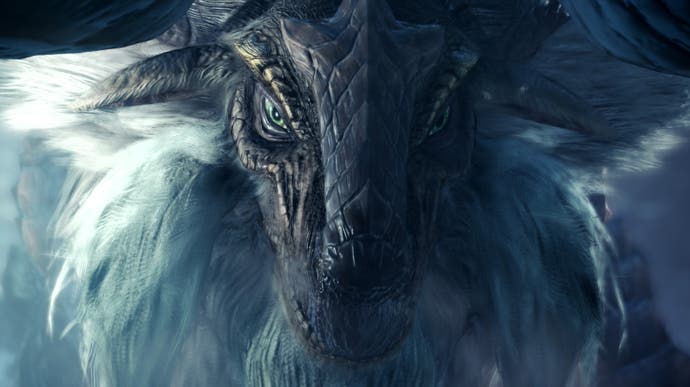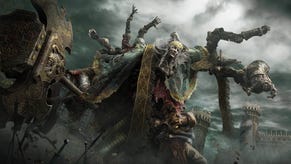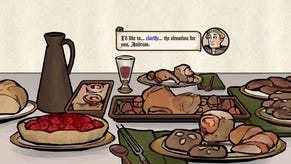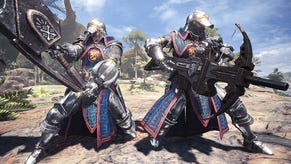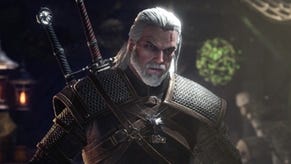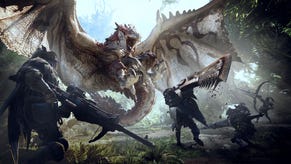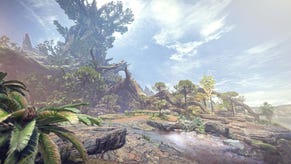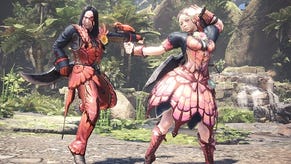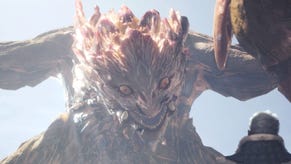Monster Hunter World devs talk Iceborne, record sales and next-gen games
Reach! Hoar the stars.
In March last year, Monster Hunter World reached an extraordinary milestone. Having shipped 7.9m copies, it became Capcom's best-selling game of all time - surpassing not only all previous entries in the Monster Hunter franchise, but also every single Resident Evil title.
A year on, Monster Hunter World is still a massive game that consistently ranks in Steam's top 10 most-played list, with a concurrent player count of 51k (at time of writing). And the developer's also showing no signs of slowing down: with the massive paid expansion Iceborne set to launch in full on 6th September, and the promise of free updates in future.
To reflect on Monster Hunter World's continuing success and Capcom's future plans for the franchise, I sat down with producer Ryozo Tsujimoto and directors Kaname Fujioka and Daisuke Ichihara at this year's Gamescom, where we discussed everything from crunch to next-generation games.
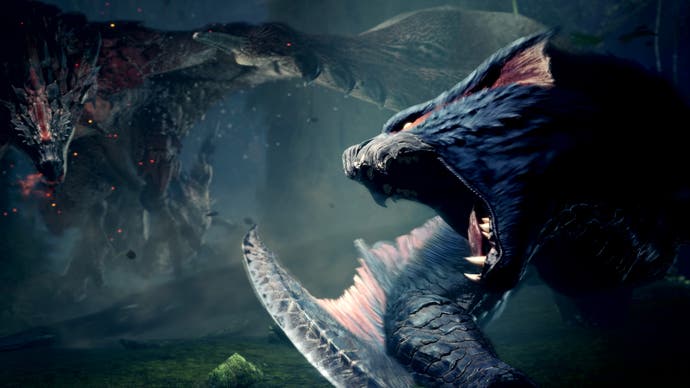
Monster Hunter World has done incredibly well in terms of sales - did these surpass your expectations?
Tsujimoto: With World, we were really pushing to bring the series global, so it's the first time we've had a simultaneous global release for a Monster Hunter game in the west and in Japan, and we of course wanted to make it a big success - with every title in the series we've wanted to bring it to more people than the previous one, so we wanted to have an upward tick on the chart for sure. Still, it's now Capcom's best-selling game in history with over 10m sold, I think the current figure is 13m. So that absolutely blew away our expectations. But we're not resting on our laurels, we want to make sure that with the expansion, people who still haven't got on board with Monster Hunter still have a chance to see how great the game is.
Would you say that Monster Hunter World has "cracked the west"?
Tsujimoto: There will always be more people left who haven't played the game - who don't know about it, who aren't interested yet - and as I said, we don't want to sit back and be satisfied with our own achievements. I think it's been the best success in the west yet for the entire series, but we're always looking forward to see how we can make things bigger and better.
Moving on to Iceborne, the expansion has a fair level requirement (Hunter Rank 16) before you can begin the story - so what can it offer lower-level players?
Tsujimoto: As you said, to play the Iceborne content itself you need to have beaten the story of World, so that's Hunter Rank 16, and you've beaten the final boss. If you've got World and you've got a save data along the way, or you've never even played World, or you've never thought of it, all of the changes and updates and new moves and actions are still back-ported into World's content: for example, the clutch claw that you've seen in all the gameplay videos (the grappling hook mechanic), or the new weapon balances and features that we're discussing in our developer diaries. Things like the view mode and screenshots, and tweaks to various options. All of that stuff isn't locked into the Iceborne section, it's there from the start of the World story if you want to use it, or if you're already part-way through you can pick up and use all the new Iceborne content. While of course the new monsters and story content is the main reason to get it, I think you shouldn't be put off that you can't get it until you beat World. Get it first, and then use it to get through World in a fresh new way.
As Monster Hunter World was seen to open up the series to more players, and more casual players, I was wondering if Iceborne is an effort to appeal to the traditional "hardcore" Monster Hunter player base?
Fujioka and Ichihara [the interpreter combined their answers]: Well, Iceborne is adding the Master Rank to the game, and it's kind of equivalent to what used to be called G-Rank, and in the old days there'd be a standard title - say, Monster Hunter 3 or Monster Hunter 4, and then a new title would be released in the west called Ultimate version - in Japan it was the G version. That's still the basic structure, but it isn't like Iceborne is endgame content, it isn't something that is only playable if you've completely mastered everything about the game and you're a super hardcore player. I think if you're someone who's played a lot and enjoyed it and you've beaten the game, no matter whether you are within that hardcore fan level, or you consider yourself not that hardcore, Iceborne is still for you. Iceborne itself has its own endgame content, which is the super challenging stuff that fans can beat after the story is cleared in the same way as World did, but Iceborne is definitely for anyone who likes Monster Hunter World and wants more, bigger and better.
The great thing about Iceborne is it's fully integrated with World in terms of online, so people who've got Iceborne can still play the World quests online with people who are still on World. Of course, with Iceborne you have to buy it to play it, but we've also got a system in place called Hunter Helper, so if you haven't finished World yet and want to catch up so you can play Iceborne, your friends who are a higher rank than you will actually get rewards by playing quests with you and helping you finish up your storyline. We understand there are people who are still part-way along the journey on this game, and we can reassure them it's definitely something you don't need to think 'it's not for you' just because you haven't finished yet, or because you still haven't reached a certain rank. After all, hunting a monster by yourself is fine, but when you're playing multiplayer, it opens up a great new world of helping each other out and being able to combine your strategies, and that's still the same in Iceborne.
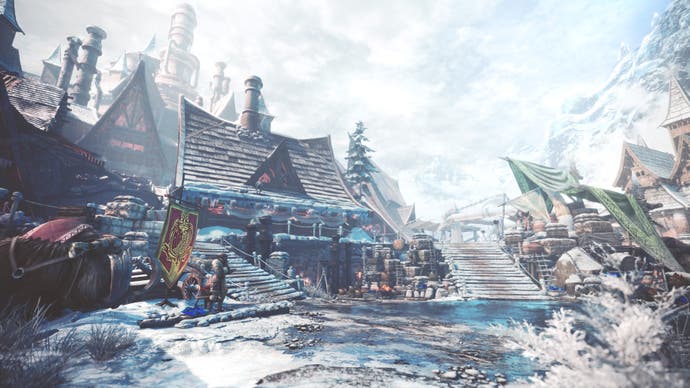
What do you think of the current discussion in the west surrounding crunch, and what's Capcom's approach to maintaining a healthy work-life balance - would you say it's different to the west?
Fujioka: There's always the tough periods at the end of development, in particular, where there's a lot of work to do and not much time left to do it in, but as a company we do value people having core time: you come in the morning and you've got time to go home, you try to get the work done as much as possible in that time. Of course there's always overtime and extra work to be done, and people are so passionate about the games they're making that if you left them to their own devices, sometimes you'd have to tell them to go home because they really want to keep working on it and keep making it better. But overall, the company is really serious about people making sure they're keeping their work-life balance in check, and as long as you're getting the work done, nobody's being tied to their chair.
You have to make yourself make the balance, as well, on both sides. Everyone thinks "if I spent another hour on this, I could make it a bit better", but you have to draw the line somewhere, and part of our job as the heads of the development team is to make sure no-one's overdoing it and causing themselves health issues or anything like that.
How long do you think Monster Hunter World will run for - will it be a continually updated game, or will there eventually be a sequel?
Tsujimoto: At the moment our main focus is... when Iceborne comes out, as we did with World, we're going to do great post-launch support for free content, like releasing periodic event quests and having seasonal events, and all that great stuff that kept people playing between the release of World until now - we plan to do that again with Iceborne. This is the only massive expansion we have in mind at the moment, and keep in mind it's not an MMO where we're saying 'here's a five-year roadmap of huge updates', it is still an action game and we've released it, and we've supported it, and then we've released this expansion which is equivalent to the way we've done it before with Master Rank and G-Rank. It's still a single game in our mind, and it isn't like it's a service where it's going to be live for 10 years, so right now our focus is once we get Iceborne out, we want to bring the same level of amazing free post-launch support.
What would a Monster Hunter game look like on a next-generation console?
Fujioka: For us it's not as simple as 'the graphics will look better', I think every time a new generation of consoles comes out the hardware has a concept behind it, or a mission statement of what it's trying to do best. We don't have that information yet, so until we know "this is the hardware that is coming, this is what it's planning to achieve, this is the kind of game that it's going to provide" - not just the process and the visuals but how online works - that kind of thing. We wouldn't be able to say what kind of game we could make.
I would say the way things are looking like they're going at the moment, we're increasingly getting into a hardware or platform-agnostic industry, and the game experience is probably going to be available wherever you want it to be in future, so if that was the case and that's where things are going next-gen, we'd have to think about how to make the gameplay work independent of our assumption that we're even going to be sitting down to play. So that could be one of the ways it goes, but we also still need to find out, just like everyone else, what's coming out, when it's coming out, and what's it going to be.
